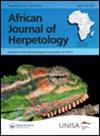Two new species of long-fingered frogs of the genus Cardioglossa (Anura: Arthroleptidae) from Central African rainforests
IF 0.9
4区 生物学
Q3 ZOOLOGY
引用次数: 5
Abstract
Abstract We describe two new frog species of Cardioglossa (Family Arthroleptidae) from Central Africa. The new species are found in the rainforests of western-central Democratic Republic of the Congo and the Republic of the Congo near the Gabonese border, respectively. We demonstrate that these species are morphologically and genetically distinct from each other and all other species of Cardioglossa. Both new species lack the dorsal hour-glass pattern present in many species of the genus, but they can be distinguished from each other and related species by distinctive colour patterns on their lateral surfaces and extremities. Both new species most closely resemble C. gratiosa, which occurs in the Atlantic coastal forests extending from Cameroon through Gabon. The new species can be differentiated from C. gratiosa by the absence of black transverse bars on all limbs or by distinctive lateral colouration. Analysis of mitochondrial ribosomal 16S DNA sequences reveals low to moderate levels (1.9–7.5%) of divergence between these new species and closely related species of Cardioglossa. The floodplains of the Congo and Ubangi Rivers may be important geographic barriers for many of these species. The occurrence of these two new lowland species in the Congo Basin reveals that the distribution and diversity of Cardioglossa in this region was underestimated. In addition, we elevate C. nigromaculata inornata to species-level status, based in part on newly available colour photographs from 1950 of specimens from the only known locality.中非热带雨林长指蛙属二新种(无尾目:节肢蛙科)
摘要本文报道了中非卡舌蛙属(节肢蛙科)的两个新种。这些新物种分别在刚果民主共和国中西部和刚果共和国靠近加蓬边境的热带雨林中被发现。我们证明这些物种在形态和遗传上彼此不同,也不同于所有其他种类的心舌鱼。这两个新物种都缺乏许多属物种的背部沙漏图案,但它们可以通过侧面和四肢上独特的颜色图案来区分彼此和相关物种。这两个新物种最相似的是C. gratiosa,它出现在从喀麦隆到加蓬的大西洋沿岸森林中。新种可以通过所有四肢上没有黑色横条或具有独特的侧边颜色来与C. gratiosa区分开来。线粒体核糖体16S DNA序列分析显示,这些新种与近缘种之间存在低至中等水平(1.9-7.5%)的差异。刚果河和乌班吉河的泛滥平原可能是许多这些物种的重要地理屏障。这两个低地新种在刚果盆地的出现,揭示了该地区红舌虫的分布和多样性被低估了。此外,我们将C. nigromaculata inornata提升到物种水平,部分基于1950年新获得的唯一已知地点标本的彩色照片。
本文章由计算机程序翻译,如有差异,请以英文原文为准。
求助全文
约1分钟内获得全文
求助全文
来源期刊

African Journal of Herpetology
ZOOLOGY-
CiteScore
3.00
自引率
6.70%
发文量
15
审稿时长
>12 weeks
期刊介绍:
African Journal of Herpetology (AJH) serves as an outlet for original research on the biology of African amphibians and reptiles. AJH is an interdisciplinary journal that publishes original articles and reviews from diverse fields and disciplines, such as conservation, phylogenetics, evolution, systematics, performance, physiology, ecology, behavioural ecology, ethology, and morphology.
The Journal publishes two issues a year. There are no page charges .
 求助内容:
求助内容: 应助结果提醒方式:
应助结果提醒方式:


